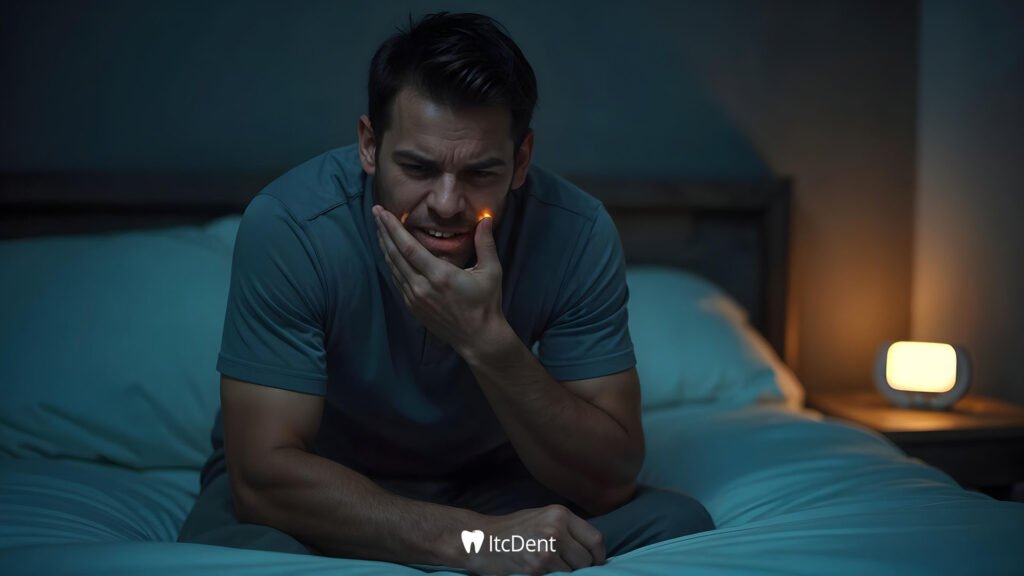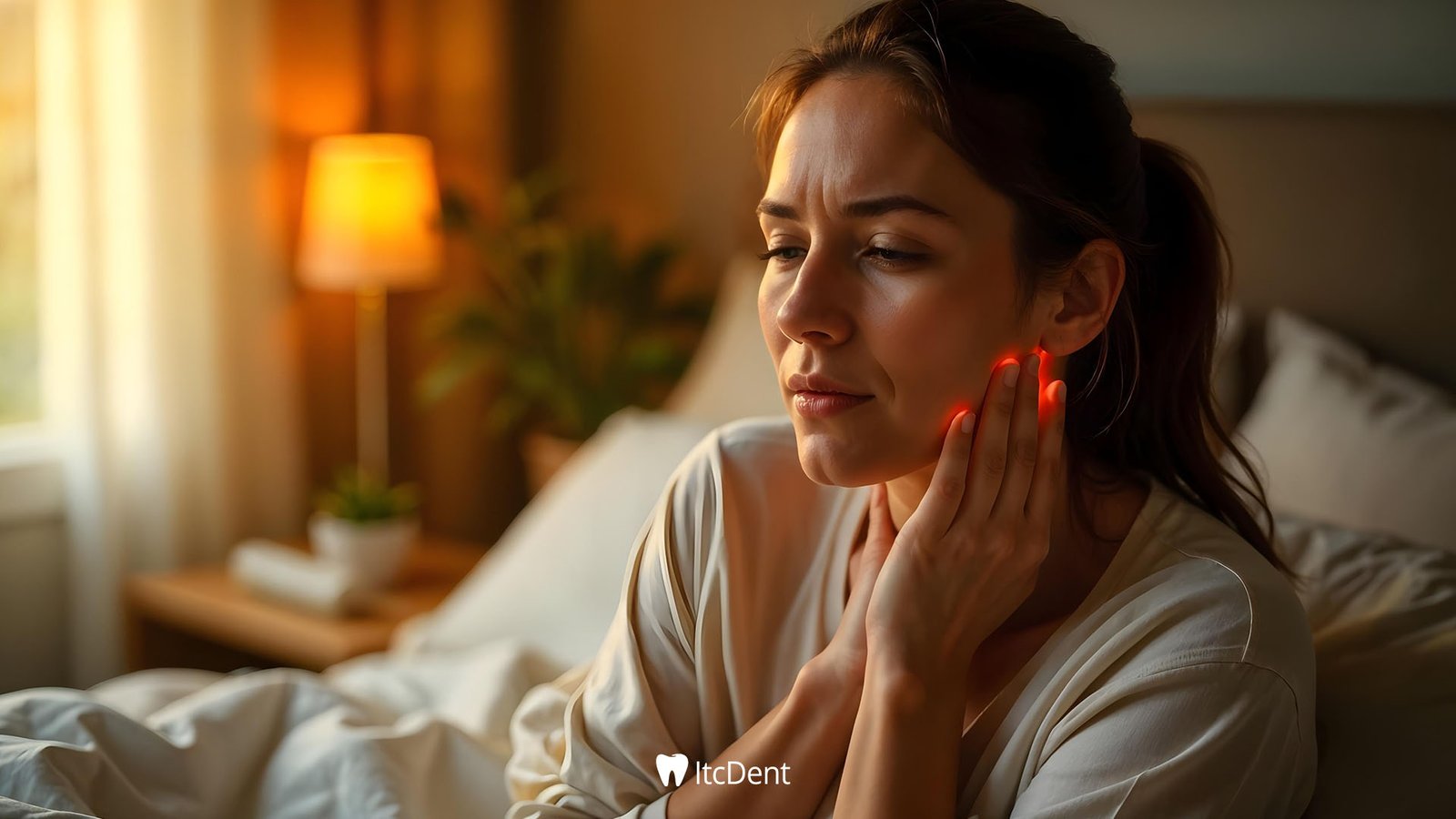Causes of Morning Jaw Pain?
Do you feel pain in your jaw when you wake up in the morning? Is there a pressure or restlessness in your face, head or ears that you cannot explain? Do you feel tiredness in your jaw throughout the day, or even notice that your teeth are sensitive from time to time? If you are experiencing these symptoms, you may be clenching or grinding your teeth without realizing it.
The habit of clenching and grinding your teeth is a condition that often goes unnoticed. Especially unconsciously clenching your teeth during sleep can cause fatigue in the jaw muscles, wear on the teeth and even headaches over time. It can occur due to many different reasons such as stress, anxiety, misalignment of teeth or sleep disorders. If you wake up with tension in your face and pain in your jaw instead of feeling rested in the morning, the underlying cause of this situation may be your teeth grinding problem.
What is Bruxism?
It is the situation where a person unconsciously clenches or grinds their teeth. Since it usually occurs during sleep, many people are not aware of this habit. However, it can manifest itself with symptoms such as jaw pain, headache, tooth sensitivity or fatigue in the morning. In the long term, it can cause tooth enamel erosion, problems in the jaw joint and even tension in the facial muscles.
The most common causes include stress, anxiety and sleep disorders. Tension and anxiety experienced during the day can lead to involuntary contraction of the jaw muscles subconsciously. In addition, misalignment of the teeth (malocclusion), some neurological disorders and lifestyle factors can also trigger bruxism. It is known to be more common in people under intense stress or those with disturbed sleep patterns.
The problem of teeth grinding can negatively affect not only dental health but also general quality of life. Instead of waking up rested in the morning, you may feel uncomfortable pressure in the jaw and facial area. Over time, this situation can lead to permanent problems in the jaw joints and even cause tooth loss. Therefore, noticing bruxism early and taking the necessary precautions protects your dental health and increases your quality of life.

What Causes Bruxism?
Although the exact cause of bruxism is not known, it is thought to occur as a result of multiple factors coming together. Sometimes we clench or grind our teeth without even realizing it. So, what are the factors that trigger this habit?
- Stress and Anxiety
The stress, anxiety and intense emotional pressures experienced in daily life can cause our bodies to react in different ways. Some of us clench our teeth when we are stressed, while others unknowingly keep our jaw muscles tense. Stress accumulated during the day in particular can manifest itself as unconscious teeth clenching or grinding during sleep at night.
- Sleep Disorders
Some disorders that affect sleep quality, especially respiratory problems such as sleep apnea, can trigger bruxism. Irregularities experienced during sleep can cause the body to react unconsciously and cause the jaw muscles to work excessively.
- Malocclusion of Teeth
If your teeth do not fit together properly, that is, if the upper and lower teeth do not close properly, the tendency to clench your teeth may increase as the jaw tries to find its natural balance. This can also lead to problems in the jaw joint over time.
- Nutrition and Lifestyle
Factors such as caffeine, alcohol and cigarette consumption can aggravate bruxism by stimulating the nervous system. Especially drinking too much caffeine or drinking alcohol before going to bed can cause the jaw muscles to work harder during sleep.
- Neurological and Systemic Disorders
Some neurological diseases, especially disorders related to the nervous system such as Parkinson’s, can cause bruxism. In addition, some medications can increase the tendency to grind your teeth.
What are the Symptoms of Bruxism?
Bruxism is often a condition that goes unnoticed, but some symptoms that occur in the morning may be a sign of it. If you wake up with pain or fatigue in your jaw and facial muscles, this may indicate that you have been clenching your teeth throughout the night. Headaches in the temple area, tooth sensitivity, tooth enamel erosion, and even occasional earaches or ringing can also be associated with bruxism.
Some people may experience a clicking or catching sensation in their jaw joint, and your partner may even notice the sound of teeth grinding during sleep. If you experience several of these symptoms frequently, it may be useful to consult a specialist to protect your teeth and jaw health.

Bruxism Treatment
The treatment of bruxism may vary depending on the underlying cause and can usually be controlled with a combination of more than one method. Night guards specially prepared by dentists can reduce abrasion and pain by preventing teeth from rubbing against each other. In addition, stress management techniques such as yoga, meditation and breathing exercises can be very useful, as stress is known to trigger bruxism.
Exercises to relax the jaw muscles and professional physiotherapy applications can also help reduce tension in the jaw area. It is also important to review daily life habits; especially limiting caffeine and alcohol consumption, quitting smoking and creating a healthy sleep pattern can reduce the severity of bruxism. If you think your teeth grinding habit is severe, you can consult a dentist and evaluate treatment options suitable for your dental structure.
In addition, if you have sleep apnea or other health problems, you may need to see a doctor. Taking early measures to control bruxism will help you protect your dental health and overall quality of life in the long term.
Can Bruxism Be Prevented?
Although it cannot be completely prevented, it is possible to control bruxism and relieve symptoms. Paying attention to stress management in daily life, developing regular sleep habits and adopting a healthy diet can be effective in reducing the risk of bruxism.

Night Plate Prices
Night plates are one of the most common solutions used to prevent teeth clenching and grinding problems caused by bruxism. These plates, which are specially prepared by dentists, help reduce abrasion, jaw pain and other discomfort by preventing teeth from rubbing against each other.
The prices of night plates may vary depending on the type of material used, whether the plates are personalized or not, and the service standards of the clinic where the treatment is performed. In addition, some dentists offer more durable and long-lasting custom-designed plates, while others may provide more economical and standard solutions.


